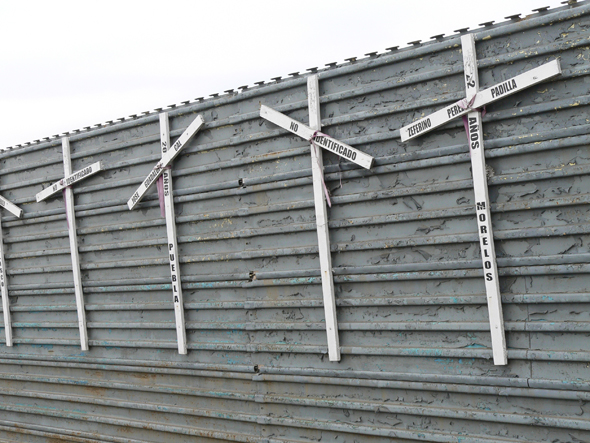A half hour from my house stands an icon I used to rarely think about.
The San Ysidro Port of Entry is considered one of the busiest border crossings in the world. About 300,000 people commute back and forth every day through this entry point. The political boundary between the U.S. and Mexico also marks the border with the greatest economic disparity of the world.
Growing up white in San Diego, you can mostly ignore the border. Ignore the city and its cultural offerings. Ignore the people, the restaurants, the hotels. Ignore the violence that sparked there in the past decade, ignore the plight of people deported, ignore the brutal iron fence that stands sentry in the waves on a beautiful beach in the borderland.
Why would you go to Tijuana when everything you think you need is on this side of the fence? Why would you think about the border when it so rarely touches your life?
This isn’t true of every white person. I have friends who regularly travel to Baja — to surf, to vacation, to serve, to explore. Others seek out cheap medicine or healthcare, or the raucous, infamous Tijuana nightlife.
But despite my fluent Spanish and growing up within spitting distance of a Spanish-speaking country, I’d only visited Tijuana twice — once as a kid and once after college. I didn’t like it much either time — the pushy vendors, the activity we chose (shopping), the sense that “real” Mexico was further away in the historic cities at Mexico’s center.
So like a lot of people in my hometown, I just didn’t think much about Tijuana, much like you ignore an occasionally itchy tag in the back of a shirt.
A few years ago, though, I started attending a local Spanish-language church, and the border — so close and so far away — got more uncomfortable. Less like an annoyance and more like a wound. Less like someone else’s problem and more like my own.
Why, I wonder, did I feel so disconnected to my sister city? Why, as a fluent Spanish speaker, had I only visited twice? Why, when I had gone, did I feel so uncomfortable?
What was wrong with Tijuana?
No: What was wrong with me?
The spiked iron wall in the ocean divided family after family in my congregation. Women in my Bible study couldn’t go to serve on missions in their native country, because they were undocumented and would not be able to return. How could I pretend to ignore what the border meant to real human beings? Why had I never educated myself about the insane laws that governed U.S. immigration?
But it wasn’t the pathos of the border that unsettled me most. No: it was my friend Lety talking off-hand about shopping in Tijuana. It was meeting her husband’s cousins at a party and hearing them talk about their city with evident delight. Why did I choose to impoverish myself? If I wanted to know Mexico better, why keep avoiding it?
Last fall, I asked Lety if she and her husband, Juan Daniel, might visit Tijuana with my daughters and me for a morning.
I was expecting to host, but in typical Latino fashion, Lety and Juan Daniel treated us to a generous hospitality my gringo heart still struggles to comprehend. We sampled local baked goods and toured the aquarium. We strolled through a garden and got tacos at a local stand. It was a lovely day.
As we headed home, we drove along the wall that Donald Trump would boast about building higher. I couldn’t help but notice someone had attached large white wooden crosses to it every few feet, a two-dimensional Arlington. “What are those?” I asked Juan Daniel.
“They put one up every time someone dies crossing,” he said.
I breathed in. The wall and crosses went on as far as I could see.
“What do you think about Trump?” Lety asked a bit later, apropos of nothing.
I sighed. I was bewildered by his popularity, though not as bewildered as I feel now. “I feel embarrassed,” I said. “Like I should apologize to you.”
We talked about his candidacy. I assured her that he didn’t represent traditional Republicanism. I also told her his campaign wouldn’t last long.
Was it another blind spot that I did not anticipate Trump’s rise?
Writing this, I imagine white America’s blind spots like invisible crosses on our side of the fence. Crosses that mark our ignorance, our unacknowledged shame at being poor neighbors, our poor grasp of history and our own laws. Crosses that represent our hardness of heart, our privilege, our stunning lack of compassion.
Crosses of rich people who do not recognize how poor we are.
This article was adapted with author permission from You Are Here Stories.

